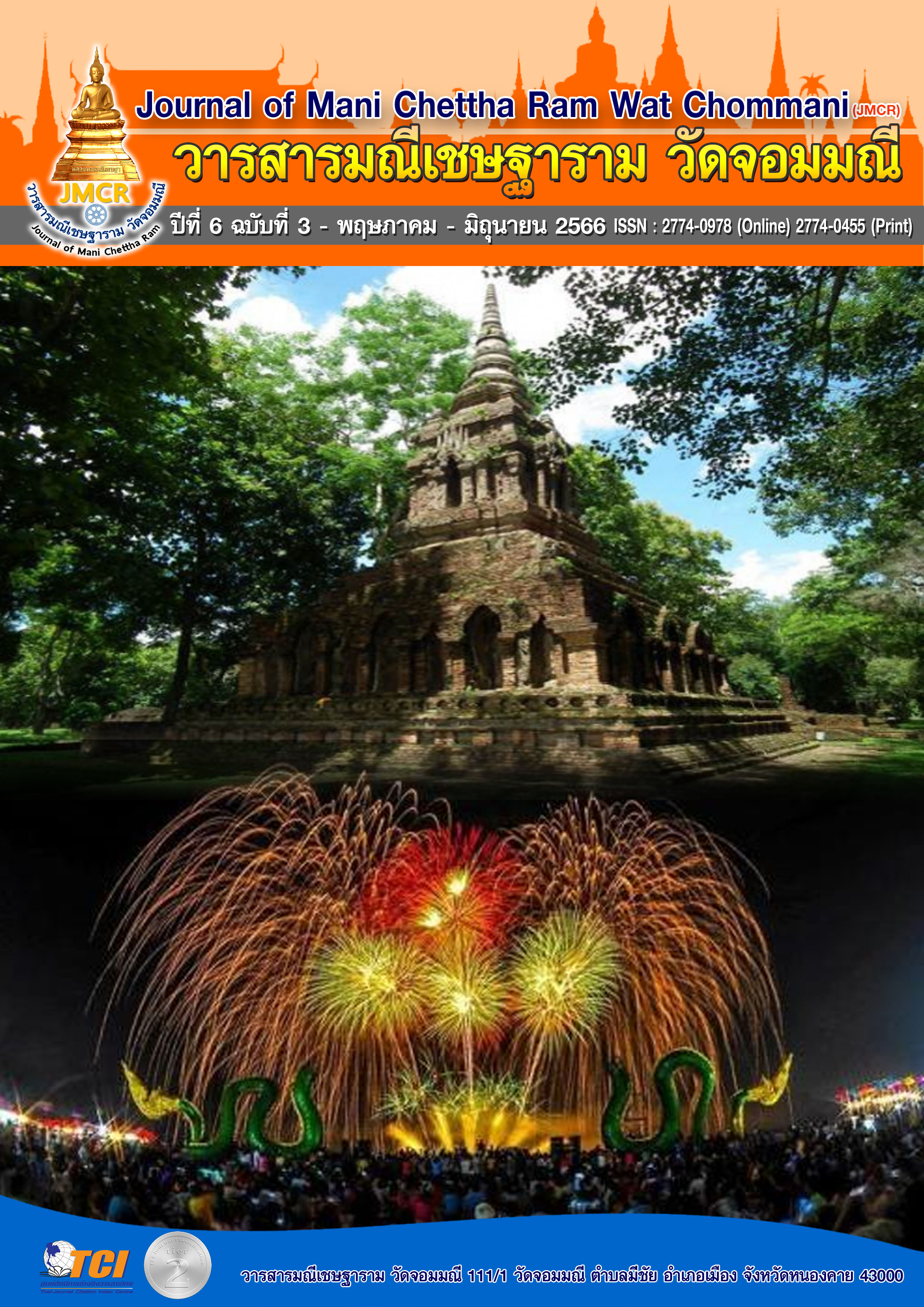แนวทางการส่งเสริมการครองคนตามหลักพรหมวิหาร 4 สำหรับผู้บริหารการศึกษาในศตวรรษที่ 21
คำสำคัญ:
ผู้บริหารการศึกษา, พรหมวิหาร 4, ศตวรรษที่ 21บทคัดย่อ
ผู้บริหารการศึกษาที่ดีควรเพียบพร้อมด้วยคุณสมบัติทั้งด้านความรู้ หลักการบริหาร ภาวะผู้นำ และมีคุณธรรมจริยธรรม สิ่งเหล่านี้จะเป็นตัวบ่องบอกถึงสมรรถภาพของผู้บริหารการศึกษาซึ่งการสร้างคุณธรรมจริยธรรมเพื่อใช้ในการบริหารเป็นสิ่งสำคัญอย่างหนึ่งของผู้บริหารที่จะทำให้สามารถดำเนินงานไปด้วยความราบรื่นและบรรลุเป้าหมายขององค์กรอย่างมีประสิทธิภาพและประสิทธิผล บทความนี้ผู้เขียนมีจุดมุ่งหมายเพื่อเชื่อมโยงแนวทางการส่งเสริมการครองคนตามหลักพรหมวิหาร 4 สำหรับผู้บริหารการศึกษาในศตวรรษที่ 21 ด้วยการนำหลักพรหมวิหาร 4 มาประยุกต์ใช้ โดยการเชื่อมโยงให้เห็นความสำคัญของการนำหลักธรรมมาใช้ในการบริหารเพื่อส่งเสริมคุณธรรมจริยธรรมแก่ผู้บริหารและเพื่อประโยชน์ส่วนรวมขององค์กร ดังนั้นผู้บริหารการศึกษาซึ่งเปรียบเสมือนกัปตันเรือที่จะนำลูกเรือมุ่งสู่เป้าหมายของสถานศึกษานั้นควรมีหลักธรรมเพื่อใช้ในการครองคน ซึ่งหลักธรรมพรหมวิหาร 4 อันประกอบด้วย เมตตา กรุณา มุทิตา และอุเบกขา นั้นเป็นหลักธรรมที่เกี่ยวข้องในการครองคนและเป็นหลักธรรมที่จดจำง่าย โดยผู้บริหารการศึกษาสามารถนำมาประยุกต์ใช้ให้เหมาะสมกับสถานการณ์ภายในสถานศึกษาของตนเองเพื่อให้เท่าทันกับยุคสมัยที่มีการเปลี่ยนแปลง
เอกสารอ้างอิง
กระทรวงศึกษาธิการ. (2554), แผนพัฒนาการศึกษาของกระทรวงศึกษาธิการ ฉบับที่ 11. (พ.ศ. 2555 – พ.ศ. 2559), กรุงเทพมหานคร: สำนักงานปลัดกระทรวงศึกษาธิการ.
_____. (2559), แผนพัฒนาการศึกษาของกระทรวงศึกษาธิการฉบับที่ 12 (พ.ศ. 2560- 2564). กรุงเทพมหานคร: สำนักงานปลัดกระทรวงศึกษาธิการ กระทรวงศึกษาธิการ.
_____. (2551). การจัดสาระการเรียนรู้พระพุทธศาสนา. (พิมพ์ครั้งที่ 5). กรุงเทพมหานคร: โรงพิมพ์ธรรมสภา.
จำเริญรัตน์ เจือจันทร์. (2548). จริยศาสตร์ : ทฤษฎีจริยธรรมสำหรับนักบริหารการศึกษา(ETHICS : Ethical Theories For Educational Asministrators). กรุงเทพมหานคร: โอเดียนสโตร์.
นงลักษณ์ วิรัชชัยศจีมาศณ วิเชียร. (2551). การสำรวจและสังเคราะห์ตัวบ่งชี้คุณธรรมจริยธรรม. กรุงเทพมหานคร: ศูนย์ส่งเสริมและพัฒนาพลังแผ่นดินเชิงคุณธรรม.
พระครูปลัดไพฑูรย์ เมธิโก (มหาบุญ). (2557). พรหมวิหารธรรมแนวทางการแก้ไขความขัดแย้งของสังคมไทย. วารสารมหาวิทยาลัยนราธิวาสราชนครินทร์ สาขามนุษยศาสตร์, 1(2), 55.
พระธรรมโกศาจารย์ (ประยูร ธมฺมจิตโต). (2543). โลกทัศน์ของชาวพุทธ. กรุงเทพมหานคร: โรงพิมพ์มหาจุฬาลงกรณราชวิทยาลัย.
_____. (2549). พุทธวิธีบริหาร. กรุงเทพมหานคร: โรงพิมพ์มหาจุฬาลงกรณราชวิทยาลัย.
พระบรมราโชวาทของพระบาทสมเด็จพระเจ้าอยู่หัว. (2565). พระราชทานในพระราชพิธีบวงสรวงสมเด็จพระมหากษัตริยาธิราช ณ ท้องสนามหลวง. เรียกใช้เมื่อ 16 มิถุนายน 2565 จาก http://nkrafa.ac.th/edu/kingspeech.html
มหาจุฬาลงกรณราชวิทยาลัย. (2539). พระไตรปิฎกภาษาไทยฉบับมหาจุฬาลงกรณราชวิทยาลัย. กรุงเทพมหานคร: มหาจุฬาลงกรณราชวิทยาลัย.
มหาวิทยาลัยสุโขทัยธรรมาธิราช, (2540). การบริหารงานบุคคลในโรงเรียน. นนทบุรี: โรงพิมพ์มหาวิทยาลัยสุโขทัยธรรมาธิราช.
สมเด็จพระพุทธโฆษาจารย์ (ป.อ. ปยุตฺโต), (2546). พจนานุกรมพุทธศาสตร์ ฉบับประมวลธรรม. (พิมพ์ครั้งที่ 12). กรุงเทพมหานคร: โรงพิมพ์มหาจุฬาลงกรณราชวิทยาลัย.
_____. (2551). พจนานุกรมพุทธศาสตร์ฉบับประมวลธรรม. (พิมพ์ครั้งที่ 16). กรุงเทพมหานคร: บริษัท เอสอาร์พริ้นติ้งแมสโปรดักส์ จำกัด.
สุรีย์ มีผลกิจ และคณะ. (2543). พระพุทธกิจ 45 พรรษา. กรุงเทพมหานคร: บริษัทคอมฟอร์ม.
สิวลี ศิริไล. (2550). คุณธรรมและจริยธรรมวิชาชีพ ใน เอกสารประกอบคำาบรรยาย ณ มหาวิทยาลัยราชภัฎสวนสุนันทา. กรุงเทพมหานคร: มหาวิทยาลัยราชภัฎสวนสุนันทา.




